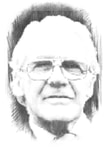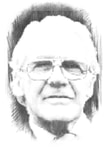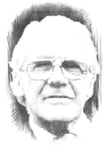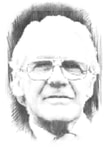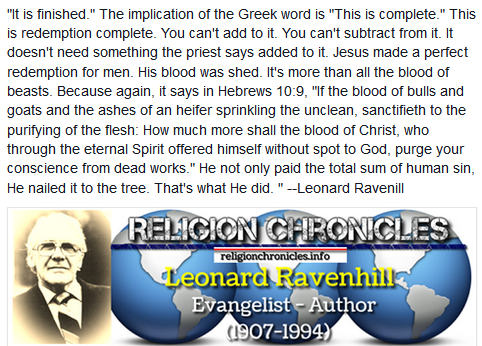Leonard ravenhill
Leonard Ravenhill was born in Leeds, in Yorkshire, England on June 18, 1907. Ravenhill was educated at Cliff College in England and sat under the ministry of Samuel Chadwick. He was a student of church history, with a particular interest in Christian revival. His evangelistic meetings during the Second World War drew large crowds. Many converts devoted themselves to Christian ministry and foreign missions. In 1939, he married an Irish nurse, Martha. The Ravenhill's had three sons: Paul, David, and Philip. Paul and David are Christian ministers, and Philip is a teacher. In 1950, Ravenhill and his family moved from Great Britain to the United States. In the 1980s, Ravenhill moved to a home near Lindale, Texas, a short distance from Last Days Ministries Ranch. He regularly taught classes at LDM and was a mentor to the late Keith Green. He also spent some time teaching at Bethany College of Missions in Minnesota, and some time in Seguin, Texas. November 27, 1994: Ravenhill died and is interred at Garden Valley Cemetery in Garden Valley, Texas, near the grave of Contemporary Christian music artist Keith Green.
Feb 20, 2023: Baptist News Global: Questions to ask while pondering if Asbury is hosting a ‘true revival’
In their chapel service for “When God Comes,” Chris Bounds, a professor at Wesley Seminary, referred to one of the Asbury Revival preachers of the past named Leonard Ravenhill. Bounds joked: “Some of us at the time called him Leonard Raving Mad, because he stood in this pulpit and basically scared the hell out of me. And I did not swear when I said that. As I realized, that’s what he is intending to do — scare the hell out of us.
“He told me I was a sinner, a hypocrite, and if I didn’t change, I’d go to hell. Prophets are never very popular people. But, oh, the freedom that comes — I don’t know how to say this strongly enough — the freedom that comes when you get to a place where you realize, ‘I’m just a no-good, low-down, dirty rotten bum. And everybody else is too. And they know I am.’ Isn’t it a glorious reality to live in?”
In their chapel service for “When God Comes,” Chris Bounds, a professor at Wesley Seminary, referred to one of the Asbury Revival preachers of the past named Leonard Ravenhill. Bounds joked: “Some of us at the time called him Leonard Raving Mad, because he stood in this pulpit and basically scared the hell out of me. And I did not swear when I said that. As I realized, that’s what he is intending to do — scare the hell out of us.
“He told me I was a sinner, a hypocrite, and if I didn’t change, I’d go to hell. Prophets are never very popular people. But, oh, the freedom that comes — I don’t know how to say this strongly enough — the freedom that comes when you get to a place where you realize, ‘I’m just a no-good, low-down, dirty rotten bum. And everybody else is too. And they know I am.’ Isn’t it a glorious reality to live in?”
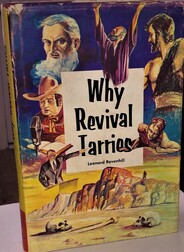
1959: Why Revival Tarries by Leonard Ravenhill; Bethany Fellowship. Ravenhill wrote many books but Why Revival Tarries is considered his best and has been an international best-seller for over 40 years. Ravenhill's writing is weighty with a gravitas that modern Christian writers lack. He is eminently quotable, each sentence of this book feels as if it were placed on a scale before being written down. His work fulfills the ministry of a prophet challenging God's people to repent of their carnality, backsliding and lukewarmness. He lamented the curses of Modernism and entertainment that were compromising the church in the 1960s and 70s. If he thought the condition of the church was bad then, I wonder what he would say today? God help us.
Judgment Seat of Christ Leonard Ravenhill


